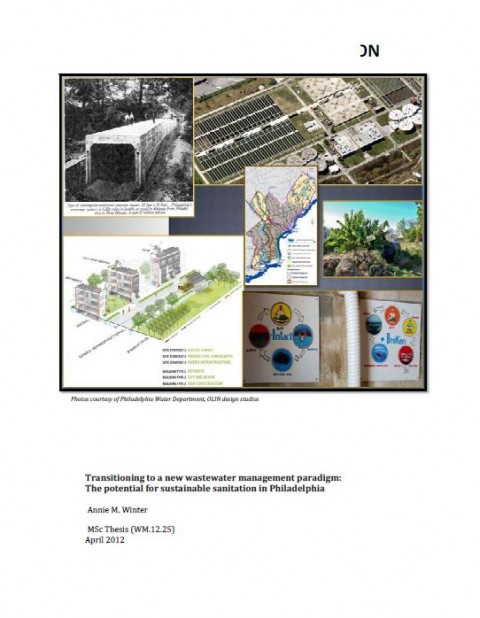Transitioning to a new wastewater management paradigm: The potentional for sustainable sanitation in Philadelphia Winter, A. (2012)
The current state of wastewater management in the city of Philadelphia is
insufficient to meet the standards established in the U.S. Clean Water Act. This thesis investigates the problems facing wastewater management in the city by analyzing the institutions, stakeholders, and historical development of the current wastewater management system. Alternatives to the current centralized system, known as "sustainable sanitation", follow the spectrum from low-tech to high-tech, but are united by the fact that they address the three main problems plaguing contemporary centralized wastewater management systems: (1) closing the water cycle; (2) a shift away from the ideology of "waste management" to one of "resource recovery", specifically with respect to energy and nutrients; and (3) addressing the need for wastewater treatment at a decentralized level. At present, the wastewater treatment system in Philadelphia has incorporated some elements of the sustainable sanitation theory by harnessing the energy potential within wastewater, rehabilitating its biosolids recycling program, and increasing the pervious area within the city to increase stormwater infiltration. However, nutrient capture and reuse and the absence of decentralized technologies remain an issue. The key obstacles are identified as the legacy of historical decisions that preclude the available options as well as a lack of sufficient knowledge and interest among two key institutions in the decision-making environment, the Philadelphia Water Department and two influential research institutions, the University of Pennsylvania and Drexel University.
Bibliographic information
Winter, A. (2012). Transitioning to a new wastewater management paradigm: The potentional for sustainable sanitation in Philadelphia MSc Thesis, UNESCO-IHE Institute for Water Education, Delft, The Netherlands
Filter / Tags
Urban (entire city)Case studies in other formatsEnglish
Downloads
Transitioning to a new wastewater management paradigm: The potentional for sustaniable sanitation in Philadelphia
Type: application/pdf
Size: 6.58 MB

